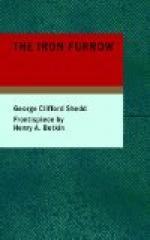“Come, by all means,” Louise replied, with a nod.
CHAPTER XXII
A week of twenty-below-zero weather opened the month of January and halted work on the mesa. At that time four miles of canal remained to be dug. Bryant and Pat Carrigan sat by the stove in Lee’s shack and waited, as the whole camp waited, for the thermometer to rise. On one of these mornings, when Dave had gone across the street to the engineers’ building, Lee informed the contractor that company funds were not far from exhausted and related his talk with Gretzinger before the latter’s departure for New York.
“So he would squeeze you out,” Pat remarked. “What you might expect from him, nothing more! I’ve had the notion for some time that your cash was getting low, from the way the money has gone.”
“I’ve spent five thousand on engineering, medical, and general accounts,” Lee stated, “twenty thousand on concrete work, and paid you forty thousand. I’ve fifteen thousand left from the sale of bonds and a personal loan I obtained from McDonnell. That will pay for about two weeks’ work. And I think we’ve made every dollar go as far as it would under the circumstances.”
“My word for that.”
“It’s this little trick of Menocal’s that’s burning up good coin. Sixty thousand would have built the project ordinarily; my estimates were correct enough. But having to do the job in this infernal weather is what’s raising the cost forty thousand more. I feel like entering in the ledger ‘To account of frost—$40,000.00.’ Like that.” Lee scribbled the line on a sheet of paper and handed it to Pat. “But there’s one thing sure, I’ll sink the last cent I have in the ground before I quit and let those Eastern pirates get their claws into me. I’ll have you cut down your force if necessary and string the last dollar and last day’s work out till my three months’ grace is up.”
“Might try McDonnell for another loan,” Carrigan suggested.
“I hate doing that worse than anything I know. He, not the bank, let me have that twenty thousand on my unsecured note. I had nothing to offer but my stock in this company, and until the project’s finished that’s no better than so much blank paper. Loaned it to me because of my nerve, he said. And at the time I told him it would be enough money to carry me through, which I believed. Now to go back to him again——” Lee stopped, with an expression of deep chagrin upon his face.
Pat tapped the dottle from his pipe and refilled the bowl. He glanced once or twice at the engineer during the act.
“You can make a better showing now than before,” said he. “Four miles more and you’ll be to the good. One of the excitements of construction enterprises, and of irrigation projects in particular, I’ve observed, is the financing. The more often a man can go and pull his backers’ legs for cash, the better financier he is. It seems to be largely a matter of keeping at them, talking them to death, wearing them out, until they weaken and hand over the money. More than one railroad was built that way. Try it on McDonnell.”




